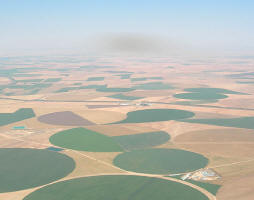 Jordan: Climate change a serious threat to Kingdom's water supply
Jordan: Climate change a serious threat to Kingdom's water supply
Jordan's water resources will be depleted by climate change even if the Kingdom witnesses an increase in precipitation, a report launched on Thursday indicated.
Climate change will severely impact the quantity of monthly surface water runoff, according to the report, indicating that even if current rainfall amounts remain unchanged, water basins and surface runoff will decrease due to rising temperatures.
In the Kingdom's Second National Communication to the United Nations Framework Convention on Climate Change (UNFCCC), experts noted that even if current rainfall levels increased by 20 per cent, it would not compensate for the water lost due to the expected rise in temperatures.
The report, prepared by the Ministry of Environment, is to serve as the foundation for an analysis of the impact of climate change on the country following the United Nations Climate Change Conference in Copenhagen in December.
The conference is expected to yield a climate change deal building upon the first phase of the UN's Kyoto Protocol, an international and legally binding agreement to reduce greenhouse gas emissions worldwide that is set to expire in 2012.
The report included an assessment of climate change vulnerability and adaptation in various sectors. It indicated that maximum and minimum temperature time series in 19 meteorological stations across the country have shown significant increasing trends over the past 45 years.
The time series recorded increasing trends in annual maximum temperatures ranging between 0.3°C and 1.8°C, while increasing trends in minimum temperatures ranged between 0.4°C and 2.8°C.
Combining this baseline data with the output of several climate models produced a projected increase in temperatures of less than 2oC by 2050, the report added.
The assessment also indicated a decreasing trend in the country's annual rainfall by 5-20 per cent over the past 45 years, indicating that the agriculture sector in Jordan is most vulnerable to climate change due to shrinking water resources.
The 2009 national communication to the UNFCCC said that climate change could have significant impact in particular on rain-fed agriculture, the livestock sector and overall food production.
It underscored that policies and strategies dealing with water scarcity have been developed and adopted, but highlighted that national policies, including the 2008-2022 national water strategy, did not consider stress added to the available water resources due to climate change.
The report was launched during a workshop, titled: "National Inter-Ministerial Dialogue on Climate Change", organised by the Ministry of Environment in collaboration with the United Nations Development Programme.
The two-day workshop, which concluded on Thursday, aimed at assessing the implications of climate change for key sectors in Jordan and providing participants with an overview of current international climate change negotiations and their links with national policies.
| Contact information |
Hana Namrouqa
|
|---|---|
| News type | Inbrief |
| File link |
http://www.jordantimes.com/?news=21574 |
| Source of information | Jordan Times |
| Keyword(s) | water supply, climate change |
| Subject(s) | DRINKING WATER , RISKS AND CLIMATOLOGY , WATER DEMAND |
| Relation | http://www.semide.net/countries/fol749974/country045975 |
| Geographical coverage | Jordan |
| News date | 08/12/2009 |
| Working language(s) | ENGLISH |
 you are not logged in
you are not logged in





